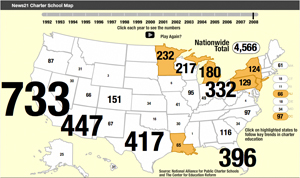Charter Schools: Who Gets to Count the Money?
Alexandra Fenwick | Jun 04, 2009 | Comments 0
BY ALEXANDRA FENWICK
If a charter school looks like a charter, is run like a charter, but its finances and academic performances are overseen by a public agency, is it still a charter school?
That is the question worrying charter advocates in a legal case being considered in New York State Supreme Court next month. It’s the first time charter oversight has reached the courts in this state.
By definition, charter schools are privately run institutions funded by public money. In exchange for promises of academic excellence, innovation and student progress, charters are allowed more bureaucratic flexibility than traditional schools. That flexibility is used for bypassing union contracts and other policies that charter advocates believe stifle success.
This case has all the earmarks of becoming a Battle Royale between those who believe charters need total autonomy from government rules and regulations and those who believe they need greater public accountability.
So far it has had more twists and turns than a second grader’s cursive. The state has argued charters must submit to the same annual financial and academic achievement audits regular public schools must undergo.
The charter school side has argued their schools not only are already subject to outside financial and academic performance audits by virtue of their charters, but they are also autonomous entities outside the public sphere and therefore exempt from state comptroller’s government scrutiny.
The charters won the case on the first go-round last year, but the decision was overturned in the state’s favor this past January. The case will go for round three on June 2, when the State Supreme Court will hear the charters’ appeal.
Charters’ freedom from government scrutiny — some say their defining feature — hangs in the balance.
Beyond charters, the case also considers the limits of the comptroller’s power. If charters lose, charter advocates say the decision might have implications for other private companies that are subject to substantial state regulations, such as Blue Cross Blue Shield, which won freedom from comptroller audits in a landmark case in 1996.
The Road to Court
Before 2005, New York schools had been spot audited by the state comptroller at random. But after an embezzlement scandal in the Long Island’s Roslyn school district that year, the state legislature passed a bill requiring a systematic audit of every single public and charter school in the state by 2010.
Shortly thereafter, state comptroller Thomas DiNapoli’s office produced a report that determined that New York City’s 23 charters weren’t being properly held to the self-imposed mandates that allowed them their latitude as charters. DiNapoli sought to audit the schools’ financial records, enrollment figures and education goals but found that the 11 annual reports he examined lacked “critical” required performance information. He determined the Department of Education lacks a formal process for reviewing performance reports and does not even require failing charters to develop corrective action plans.
Cue lawsuit. In October 2007, a group of 15 city charter schools and two charter organizations, the New York City Center for Charter School Excellence and the New York Charter Schools Association, filed a suit challenging the audits, arguing that the Board of Regents already oversees their educational merit and that the state constitution bars the comptroller from investigating their finances. The charters won this argument in April of 2008. The appellate court reversed that decision in January. The appeal of the appeal is next. DiNapoli’s office has continued to churn out report after report auditing districts across the state, but until the current appeal is resolved, the comptroller has suspended charter school audits.
Writing for the majority, defending the state’s right to audit, Justice John Lahtinen said charter schools can’t have it both ways. He argued that just because charters are allowed leeway from certain regulations, they’re still publicly funded schools and are not therefore outside public school governance.
Judge Robert Rose wrote the dissenting argument that charter schools are not political subdivisions but “independent and autonomous public schools” considered not-for-profit “education corporations” according to state law. Charter schools receive public funds only indirectly, he argued. They have no taxing authority, are not governed by publicly elected officials and have no limitations on the geographical areas they serve. Nor are their budgets voted on by the public. Therefore, charters are independent from public education and exempt from the Comptroller’s authority.
The fray
All of those examples of charters’ independence are exactly why charters should be audited, critics said. The New York State United Teachers, a union affiliated with the American Federation of Teachers, filed a “friend of the court” amicus brief siding with the comptroller against the charters last year.
“When every education dollar is precious, no one has the stomach for waste, misappropriation of funds or manipulation of data,” said NYSUT spokesman Carl Korn. “Audits are a way to make sure the public has the right to know how their tax dollars are spent.”
He was quick to point out that the union is not opposed to charters per se. In fact, teachers union represents teachers at several charters. Instead, it opposes a double standard for regulating public education spending. All schools should have uniform accountability standards.
“Charter schools talk the talk about accountability but don’t walk the walk,” Korn said. “We have never opposed charter schools. They are designed as incubators for innovative learning, and we support that. But what we also support is sunshine and transparency.”
That argument is disingenuous, said Peter Murphy, a spokesman for one of the plaintiffs in the case, the New York Charter Schools Association. Charters are transparent; they are audited by outside certified public accountants as required by their charters agreements, and the results can be requested using Freedom of Information law, he said.
“They put out this straw man argument, ‘You don’t want to be audited,’ but charter schools are all about accountability,” Murphy said. “Charter schools get shut down if they don’t perform well.”
Murphy claims that a state comptroller audit would represent a pile on of oversight that has already become a burden for charter schools. The charters are monitored by the State University of New York as the charter authorizing body, the local district and the State Board of Regents
“The constant drumbeat of compliance issues makes a mockery of charter school law,” Murphy said.
Korn said to the contrary, that charters aren’t called to account nearly enough. The understaffed Board of Regents hasn’t done a financial report on charter schools in several years.
The charters’ main argument ducks that issue altogether. Advocates believe the comptroller’s oversight is unconstitutional. They also argue that the state should first strengthen its charter law rather than audit individual schools. Or, since all the charter-granters, the State University of New York, the Board of Regents, and districts like the New York City Department of Education, are public institutions, the comptroller should audit them.
“This is about the unchecked ability of the government to audit anyone and anything that gets a public dollar,” said Murphy. “Whatever you think of charter schools, this argument is really beyond charter schools — it’s are there limits on the comptroller or not?”
Filed Under: New York City • Unchartered Territory
About the Author: Alexandra Fenwick
is a multimedia journalist who has worked as a reporter in daily newspapers in New Jersey and Connecticut for four years, including one year as an education reporter. She grew up on the Jersey shore, split her high school career between public school and private boarding school and later studied writing at Johns Hopkins University in Baltimore. She had a happy childhood, rode her bike everywhere and rarely got detention. She is trying to replicate that experience as an adult. Her byline has appeared in the Baltimore Sun, the Los Angeles Times, the Stamford Advocate, the Tribeca Tribune and Condé Nast's Portfolio.com. She graduated from Columbia University's Graduate School of Journalism in May 2009 and is currently an associate editor of the Columbia Journalism Review.













